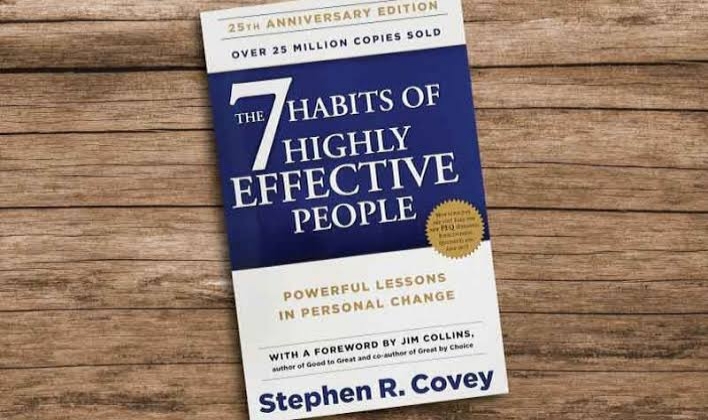
Few self-improvement books have stood the test of time like The 7 Habits of Highly Effective People by Stephen R. Covey. Since its release in 1989, it has sold more than 40 million copies worldwide and continues to shape how leaders, students, entrepreneurs, and everyday readers think about success.
But why is this book still relevant in 2025, decades after its first publication? Research shows that in 2024, over 52% of global readers preferred books related to personal development (Statista, 2024). Covey’s framework resonates because it’s not just motivational—it’s actionable psychology backed by timeless principles.
In this comprehensive summary, we’ll break down each of Covey’s 7 habits, include expert opinions from psychologists and authors, highlight pros and cons, and provide practical real-life examples you can start applying today.
What Is The 7 Habits of Highly Effective People About?
Stephen R. Covey argued that effectiveness comes from character ethics—deeply ingrained principles of integrity, honesty, and service—rather than quick fixes. His habits are divided into three stages:
- Private Victory (Habits 1–3): Focus on self-mastery.
- Public Victory (Habits 4–6): Build strong relationships.
- Renewal (Habit 7): Sustain long-term growth.
Psychologist Dr. Carol Dweck, known for her Growth Mindset research, notes that Covey’s habits align with modern behavioral science:
“Covey’s emphasis on proactive behavior and continuous learning reflects what psychology today calls a growth mindset. His framework is more relevant now than ever.”
Habit 1: Be Proactive
Take responsibility for your actions.
Instead of reacting to circumstances, proactive people focus on what they can control.
- Expert Insight: Dr. Angela Duckworth (Grit) explains, “Proactivity is linked with resilience. People who respond based on values instead of impulses experience higher long-term success.”
- Practical Example: Instead of blaming deadlines, a proactive student creates a study plan weeks in advance.
Pros
- Builds emotional control
- Reduces stress from external factors
Cons
- Can feel overwhelming if taken to extremes (trying to control everything)
Habit 2: Begin with the End in Mind
Define your goals before you act.
Covey encourages readers to write a personal mission statement, envisioning their ideal life and aligning daily actions with long-term goals.
- Example (2025 update): With AI and remote work expanding, professionals who define a “North Star” avoid burnout by aligning work with deeper values.
- Expert View: Author James Clear (Atomic Habits) says, “Clarity of identity leads to clarity of action. When you know your ‘why,’ habits naturally align.”
Pros
- Provides long-term direction
- Strengthens decision-making
Cons
- May feel restrictive if goals are too rigid
Habit 3: Put First Things First
Prioritize what matters most.
This habit focuses on time management and discipline, distinguishing between what is urgent vs. important.
- Example: Instead of scrolling social media, a writer dedicates their morning hours to finishing a book draft.
- Latest Data (2025): Studies show the average adult spends 3+ hours daily on social media. Applying Habit 3 can reclaim that time for high-value tasks.
Pros
- Increases productivity
- Reduces procrastination
Cons
- Can feel overly structured for spontaneous people
Habit 4: Think Win-Win
Seek mutual benefit in all interactions.
Rather than competing, effective people look for solutions where everyone gains.
- Expert Insight: Psychologist Dr. Adam Grant (Give and Take) notes: “Win-win thinking improves collaboration and prevents toxic workplace dynamics.”
- Example: A manager negotiates flexible hours, benefiting both employees and the company.
Pros
- Builds trust in relationships
- Encourages collaboration
Cons
- Not always possible in zero-sum scenarios
Habit 5: Seek First to Understand, Then to Be Understood
Listen before speaking.
Covey emphasizes empathetic listening—understanding others before pushing your own agenda.
- Expert View: Harvard psychologist Dr. Daniel Goleman (Emotional Intelligence) explains: “Active listening is the foundation of emotional intelligence. It transforms relationships.”
- Example: Instead of arguing in a meeting, an employee first asks clarifying questions, then presents their viewpoint.
Pros
- Strengthens communication
- Builds emotional intelligence
Cons
- Can be misused if others don’t reciprocate
Habit 6: Synergize
Combine strengths to achieve more together.
This habit is about valuing differences and creating innovative solutions through teamwork.
- Example: In 2025, hybrid teams across countries thrive when they leverage cultural diversity for creative problem-solving.
- Expert Note: Organizational psychologist Dr. Amy Edmondson (known for Psychological Safety) says, “True synergy emerges in teams where members feel safe to share diverse ideas.”
Pros
- Encourages creativity
- Strengthens collaboration
Cons
- Requires patience and openness to conflict
Habit 7: Sharpen the Saw
Renew yourself regularly.
Covey’s final habit emphasizes self-care, learning, and balance across four areas: physical, mental, emotional, and spiritual.
- 2025 Trend: The global wellness industry reached $5.6 trillion in 2024 (Global Wellness Institute), proving people increasingly invest in health and renewal.
- Practical Example: A software engineer avoids burnout by combining exercise, meditation, and online learning.
Pros
- Prevents burnout
- Supports lifelong growth
Cons
- Requires consistent effort and time investment
Why The 7 Habits Still Matters in 2025
- Timeless Framework: The habits are rooted in universal principles, not trends.
- Backed by Psychology: Modern behavioral science validates Covey’s methods.
- Adaptable to AI Age: As automation grows, habits like proactivity and synergy are critical human skills.
Criticisms of The 7 Habits
While impactful, some readers argue:
- The book is dense and repetitive, making it harder for beginners.
- Certain habits (like synergy) are idealistic and harder to apply in toxic environments.
- It assumes readers have time for deep reflection, which many struggle with.
Practical Applications for Readers
- Students: Use Habit 3 to prioritize exams over distractions.
- Professionals: Apply Habit 2 when planning career paths in 2025’s evolving job market.
- Entrepreneurs: Build partnerships using Habit 4 (Win-Win).
- Parents: Model Habit 5 (Empathetic Listening) with children.
FAQs About The 7 Habits of Highly Effective People
Q1. Is The 7 Habits still worth reading in 2025?
Absolutely. With the rise of AI, soft skills like proactivity, empathy, and synergy are more valuable than ever.
Q2. How long does it take to apply the habits?
It depends on consistency. Many readers see changes within 3–6 months of daily practice.
Q3. Is it beginner-friendly?
Yes, though some concepts may feel deep. Pairing it with modern summaries or workbooks can help.
Q4. Can teenagers benefit from it?
Yes. In fact, Covey’s son Sean Covey adapted it into The 7 Habits of Highly Effective Teens, which remains popular in schools.
Q5. Are there updated editions?
Yes. The 30th Anniversary Edition (2020) added insights, and many summaries in 2025 include digital-era applications.
Final Thoughts
The 7 Habits of Highly Effective People is not just a book—it’s a life framework. Whether you’re a student, professional, or entrepreneur in 2025, Covey’s habits remain a practical roadmap for personal and professional growth.
As Covey himself said: “The key is not to prioritize what’s on your schedule, but to schedule your priorities.”
If you want to take control of your life, improve relationships, and achieve sustainable success, these habits are a proven place to start.
Thank you for reading!
Stay tuned for more inspiring Books summary, Author spotlight, Trend Books & more get full information on TheBooksX.com!






